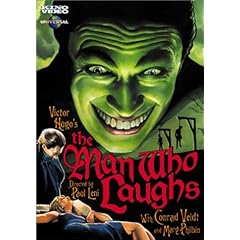 So what is this one about?
So what is this one about?Well, my beloved tells us,
One of German director F.W. Murnau's most brilliant silent films, The Last Laugh uses a constantly moving and subjective camera to capture the emotional anguish of a man whose life is suddenly devoid of meaning. An elderly hotel doorman is demoted to washroom attendant and must give up his prized uniform. Crestfallen, he spends the day wandering the city, getting drunk and trying desperately to hang on to a shred of hope.Ah yes, depression, hopelessness, and crushing sadness. Sounds just like my type of film.
And how much did I pay to watch?
Hmm, lets see here....well, its been over thirty days since I got the movie, I got it on September 9 (YIKES) and returned it on October 29. Does that show you how long it is taking me to watch a movie?? I can't even price that out. shooooooooooooooooooot
And what did I think?
One of the things that was so incredible about this film was the lead actor, Emil Jannings (or, walrus mustache, if you prefer), and his ability to change his physical being in order to communicate the utter despair, hopelessness, and humiliation he felt at being demoted, and losing his beloved and respected job.
One thing I really hated about this film was the 'epilogue'. As mentioned, the movie was entirely silent and only twice were intertitles used to explain the movement of the story. The epilogue intertitle says
"Here the story should really end, for, in real life, the forlorn old man would have little to look forward to but death. The author took pity on him and has provided a quite improbable epilogue."And, let me tell you, improbable is no joke. It turned a movie that was crushing and hopeless into a stupid, trite, "Hollywood" happy ending. (It is of course "hollywood" vs. hollywood, because it is a German film, and they didn't do hollywood. At least as far as I understand) The movie could have ended with the poor old walrus mustasche all crumpled in the bathroom where he is the attendant, with the night watchman's flashlight on him. I mean, he looks like some animal who is trapped in a cage. It was a really striking image. I don't know what it would have said about life, or film, or anything. I mean, if that movie doesn't say that life is totally worthless, that you can lose the only thing that makes your life worth living and then no one will care and everyone will just kick you while you're down, I don't know what will.
Instead, the filmmaker (really?!) decided to add an epilogue where the walrus mustache was an attendant to a rich man and then the rich man dies and leaves all his money to the attendant. Then as the newly rich walrus mustache uses the bathroom he is kind to the attendant and is mean to the rich person who treats the new attendant like trash. While I appreciate that message at the end about being kind to people who are "under" you, it just seemed out of sync with the rest of the film.
No matter, I thought it was pretty good. It would have been much better without the end, but then if it had ended where it should have ended I don't know what i would have thought.
The rest of the film was good enough. It was confusing to not have any intertitles telling me what was going on. It was something I was entirely not used to as afar as silent films go.
So what is the rating? (out of 10)
It was interesting to see a film like this. Additionally, FW Murnau is like one of the most famous directors evar. However, the end of the movie really didn't do anything for me. On Netflix I gave this film a 3 out of 5. I think I will give it a 7 here. I mean, it was interesting (which is mostly the reason I get all these silent films, to experience what films used to be like as part of my ongoing film education) but it wasn't extraordinary.


